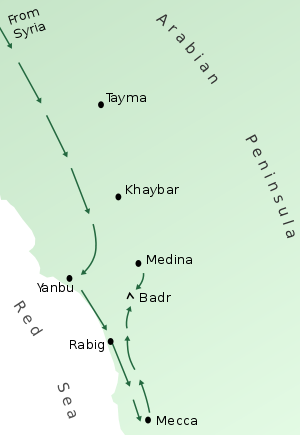Islamic History
Episode 2: Badr Battle
Before the Battle
Prior to the battle, the Muslims and Meccans had been engaging in several smaller skirmishes. It was when Muhammad (BBUH) started a raid against one of Quraish caravans heading to Mecca from Syria that the Quaraish army moved to encounter muslims and save the caravan. By this time Muhammad's army was approaching the wells where he planned to waylay the caravan, at Badr, along the Syrian trade route where the caravan would be expected to stop.
However, several Muslim scouts were discovered by scouts from the caravan and Abu Sufyan, leader of the caravan, made a hasty turn towards Yanbu. The Muslims' army continued to advance towards Badr and , when the Quraishi reached Juhfah, just south of Badr, they received a message from Abu Sufyan telling them the caravan was safely behind them, and that they could therefore return to Mecca. At this point, according to Karen Armstrong, a power struggle broke out in the Meccan army. Amr ibn Hisham wanted to continue, but several of the clans present, including Banu Zuhrah and Banu Adi, promptly went home.
Armstrong suggests they may have been concerned about the power that Hisham would gain from crushing the Muslims. A contingent of Banu Hashim, hesitant to fight their own clansmen, also left with them.Despite these losses, Hisham was still determined to fight, boasting "We will not go back until we have been to Badr." During this period, Abu Sufyan and several other men from the caravan joined the main army. The Badr wells were located on the gentle slope on the eastern side of a valley called "Yalyal". The western side of the valley was hemmed in by a large hill called 'Aqanqal. When the Muslim army arrived from the east, Muhammad initially chose to form his army at the first well he encountered, but he was apparently persuaded by one of his soldiers to move his army westwards and occupy the well closest to the Quraishi army.
Muhammad then gave the order to fill in the remaining wells, so that the Meccans would have to fight the Muslims for the sole remaining water source. The Quraish army arrived after the Muslims and numbered around 1000 men while muslims were only 313 men.

The battle
No one was aware of the importance of the outcome of the Battle as the Prophet (BBUH) himself. We might read the depth of his anxiety in his prayer before the beginning of the Battle when he stood up supplicating to Allah:
God this is Quraish. It has come with all its arrogance and boastfulness, trying to discredit Thy Apostle. God, I ask Thee to humiliate them tomorrow. God, if this Muslim band will perish today, Thou shall not be worshipped.
The battle began when Utbah Ibn Rabi-ah, his son Al Walid and his brother Sheibah (all from the Ommayad) stood in front of the Quraish army and asked the Prophet (BBUH) to send to them their equals for a dual. Hundreds of companions were around him and many of them were expecting to be called upon by the Prophet (BBUH) but he chose to start from within his own family.
The load was heavy and the heavy load could be carried only by the people to whom it belonged as he called upon Ali, Al Hamza and Obeidah Al Harith (all from the clan of the Prophet) to face the three warriors. Ali destroyed Al Walid and Al Hamza killed Utbah; then they both assisted Obeidah against his opponent Sheibah. Sheibah died immediately and Obeidah was the first martyr in this battle. He died after he lost his leg.
Now both armies began firing arrows at each other. Two Muslims and an unknown number of Quraish were killed. Before the battle started, Muhammad had given orders for the Muslims to attack with their ranged weapons, and only engage the Quraish with melee weapons when they advanced.

Map of the battle. The Meccan army (Black) approaches from the west, while the Muslim army (Red) takes up positions in front of the Wells of Badr.The strong believers who were ready to devote their lives for the sake of Islam managed to shatter the Meccan army’s lines and kill several important Quraish leaders. Then Meccan army retreated and Muslims took a number of Meccan Quraish prisoners. Their fate sparked an immediate controversy in the Muslim army. The initial fear was that the Meccan army might rally and that the Muslims couldn't spare any men to guard the prisoners.
Saad and Umar were in favor of killing the prisoners, but Abu Bakr argued for clemency. Muhammad eventually sided with Abu Bakr, and most prisoners were spared, either because of clan relations (one was Muhammad's son-in-law), desire for ransom, or the hope that they would later convert to Islam (in fact, several later would). Several Muslims who had been recently captured by allies of the Meccans were brought into the city of Mecca and executed in revenge for the defeat. However, the surviving Quraish prisoners were housed with Muslim families in Medina and treated well. According to the Muslim chronicler Ibn Ishaq "the apostle divided the prisoners amongst his companions and said, 'Treat them well.'"
By Rania ElSaadawy
References
• Armstrong, Karen (1992). Muhmmad: Biography of the Prophet. HarperCollins. ISBN 0-06-250886-5
• . Wikipedia Encyclopedia
• The Battle of Badr at Al-Islam.Org
• Translation of Sahih Muslim.. USC-MSA Compendium of Muslim Texts. Retrieved on January, 2006.